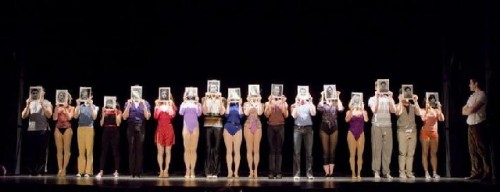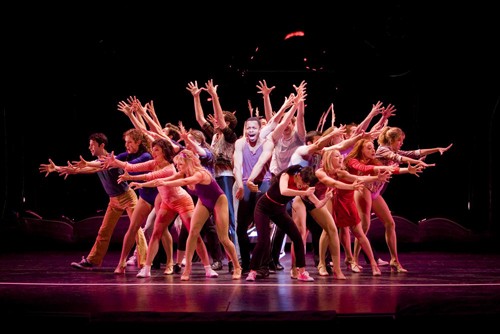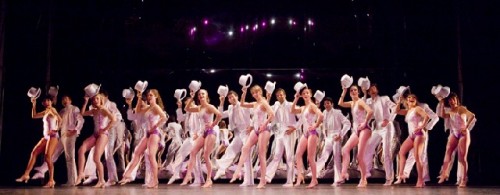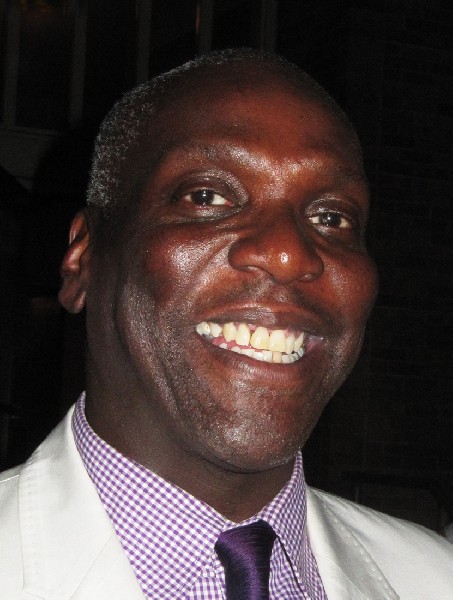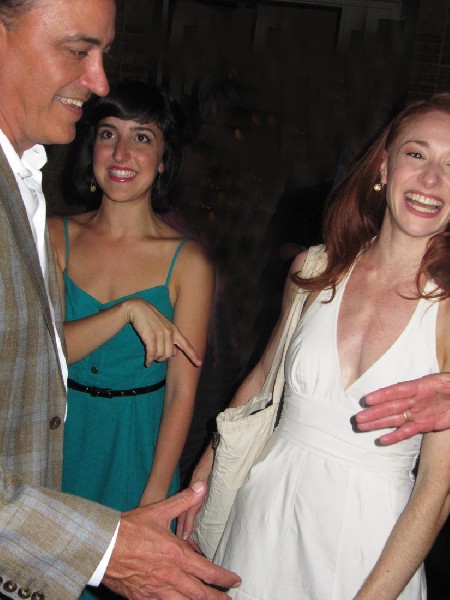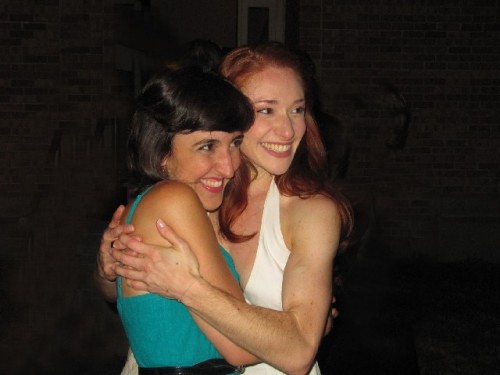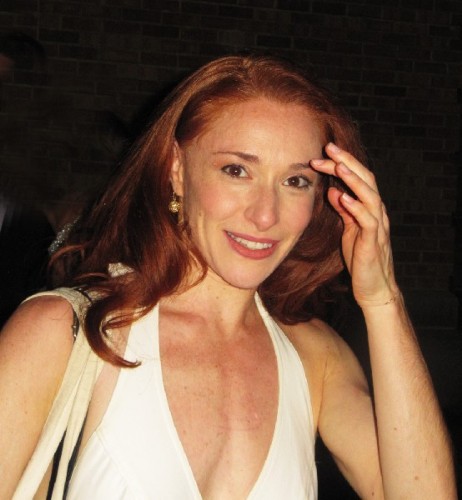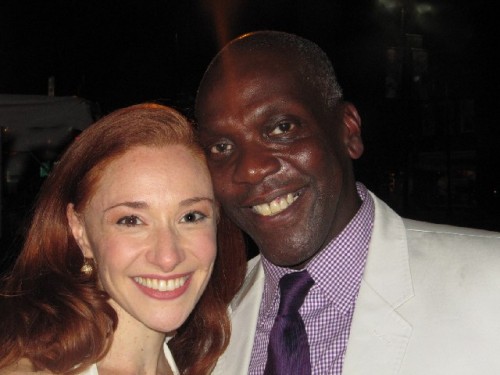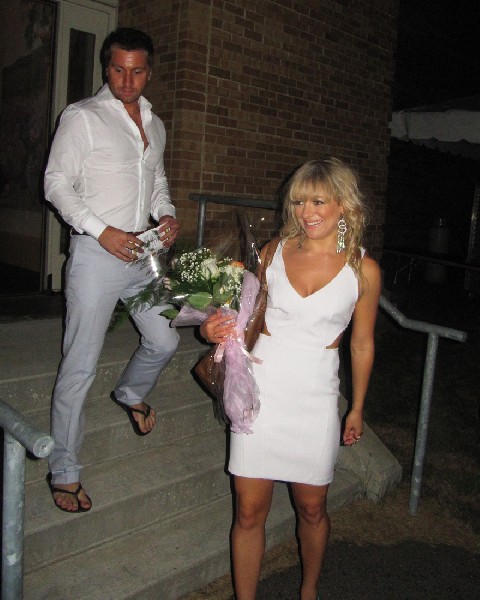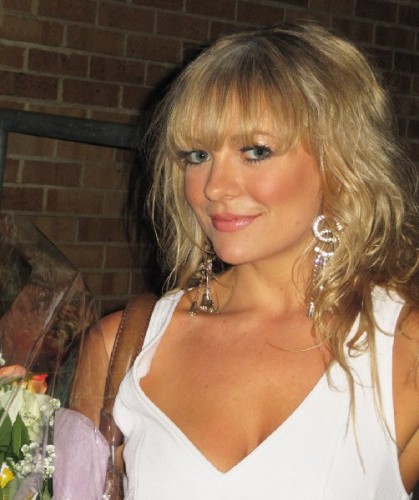Boffo A Chorus Line at Berkshire Theatre Group
Through July 21 a Heart Wrenching Barn Burner
By: Charles Giuliano - Jul 08, 2012
A Chorus Line
Conceived and Originally Directed and Choreography by Michael Bennett, Book by James Kirkwood and Nicholas Dante, Music by Marvin Hamlisch, Lyrics by Edward Kleban.
Directed by Eric Hill
Choreography by Gerry McIntyre
Music Direction by Steven Freeman, Scenic Design by Gary English, Costume Design by David Murin, Lighting by Michael Chybowski.
Cast: (Judy) Sara Andreas, (Val) Ashley Arcement, (Cassie) Nili Bassman, (Mike) Matthew Bauman, (Mark) Giovanni Bonaventura, (Diana) Natalie Caruncho, (Connie) Alex Chester, (Greg) Chris Chianesi, (Don)Warren Curtis, (Paul) Eddie Gutierrez, (Bobby) Andrew Hodge, (Larry) Bryan Thomas Hunt, (Bebe-)Julianne Katz, (Al)Tim McCarrigal, (Zach) Noah Racey, (Richie ) Neil Totton, (Kristine)Margaret Wild, (Maggie) Karley Willocls, (Sheila) Dana Winkle.
Berkshire Theatre Group
The Colonial Theatre
Pittsfield MA,
Two hours twenty minutes without intermission.
July 2-21
berkshiretheatregroup.org
Kudos to Berkshire Theatre Group for staging a fabulously vibrant production of Michael Bennett’s enduring, 1975, seminal, game changing musical A Chorus Line.
While Bennett was the genius who changed theatre this great work came about through the vision and support of the legendary Joe Papp (June 22, 1921 – October 31, 1991) and his agit-prop Public Theatre. We learned some of the back story of A Chorus Line through the film Joe Papp in Five Acts by Tracie Holder and Karen Thorsen which was shown during the recent Berkshire International Film Festival.
The inventive, paradigm shifting musical, which featured a bare stage and performers auditioning for roles in the chorus of a Broadway production, was developed through workshops. When, after an initial allotted period of time the show wasn’t coming together, Papp just allowed more time, and then time after that.
Through interminable previews the show slowly evolved and by word of mouth attracted an ever building audience. While Papp was known for theatre on a shoe string he found the backing to bring the musical to Broadway.
The show earned 12 Tony Award nominations and won nine, as well as the 1976 Pulitzer Prize for Drama. Chorus Line ran for 6,137 performances, becoming the longest-running production in Broadway history until surpassed by Cats in 1997. It remains the fifth longest-running Broadway show ever.
What proved to be so unique about Chorus Line was the stunning choreography of Bennett set to the wonderful music by Marvin Hamlisch, and lyrics by Edward Kleban.
The revolutionary aspect of the production, a paradigm for Papp’s Marxist theatre company, was the concept of conveying the real life stories of individuals auditioning for the parts. Their actual stories were crafted into the book by James Kirkwood and Nicholas Dante.
The nature of a Chorus Line is its anonymity. There is an emphasis on group precision and the repression of the individual. It is intended that we view them as a flawless unit. By its very nature no individual is supposed to stand out or shine. They are the lumpen proletariat, the anonymous workers, who with frozen smiles flesh out those big Broadway musicals.
During the audition the Svengali-like, brutal, and demanding choreographer Zach, played here with surprisingly nuanced humanity by Noah Racey, taunts and probes demanding that they reveal something of themselves. This starts with their age (some fudge on this), where they are from, and how they started with dance.
In an audition process, with head shots and resumes, those are acceptable questions. But Zach probes deeper wanting to know the depth of character and life story of the final eight he will cast from a field of 19. Three are eliminated rather quickly.
It is an uncomfortable process both for the job seekers as well as the audience. Back in 1975 it was shocking when several gay men revealed intimate details of their struggles including being bullied, incidents of masturbation, and the process of self discovery about sexual identity, or getting started in a drag show.
Last night, amazingly, it sent an offended, older male patron screaming out of the theatre in a disruptive manner. It was a tribute to the power of this classic that it still evoked that kind of immediate and visceral response. The man is to be commended for bringing this uninteded endorsement and reality check to a stunning production.
It also underscores the observation that there are no Papps and Bennetts working on Broadway today. What was so powerful and possible in 1975, through commitment and determination, just doesn’t happen anymore. Productions have become so expensive that the entire system of out of town tryouts has been dismantled. Instead shows start on Broadway with previews that average a month. Or, with the problematic Spider Man, months and months.
Shows have become so big, expensive and splashy that there is far less risk taking. Populism prevails particularly among producers and investors looking for a return on their money.
It is that kind of dumbing down and emphasis on spectacle that would make another Chorus Line with its riveting, true to life dramatic elements rare but not impossible.
Last night there was a sense of experiencing theatre history. We were thrilled to be involved first hand in such a meticulous and respectful reproduction. But take away that context and consider an evening with songs about '"Gonorrhea" or belting out a show stopper about "Tits and Ass." Were this a new musical it is possible that more than just that one guy would be bolting for the exits.
Which raises another point. We sat down at 8 PM. There were two socialites not finding their seats causing a delay. Then Kate Maguire gave opening remarks. It was not until 10:20 PM that many bolted for the rest rooms. Come on. One act? Running two hours and twenty minutes! Please.
This past season we have followed the TV show Smash by Theresa Rebeck. There are many fascinating parallels to the influence of A Chorus Line. There is the same nasty director Derek (Jack Davenport) sleeping with the women who are competing to emerge from the chorus to star as Marilyn Monroe. One might draw a direct line between the blond bombshell Val (played with zest and oomph by Ashley Acement) and TV’s Ivy (Megan Hilty). Derek is sleeping with Ivy but also seduces her competitor, Karen (Katherine McPhee).
In Chorus Line Zach’s ex, Cassie, played superbly by the stunning, red headed Nilli Bassman is auditioning. She evokes the same kind of brilliance and vulnerabity that makes Smash’s Karen so compelling. Did Rebeck just steal that character?
During the initial interactions between the auditioners and Zach, revealingly, Cassie asks if she can speak with him privately. Not now is the response. But it puts us on notice when they later have that intimate moment.
Initially Zach is hard on her. During rehearsals he seems to always be on Cassie's case to just fit in and dance like the others. Clearly she is too talented for the chorus. She had tried her wings and failed. After not working for two years she is anxious to start over in the chorus. Zach insists that she is too good for that. We agree.
Which underscores both the strength and inherent problem with Bennett’s ground breaking musical. When they all dance together (in the terrific choreography of Gerry McIntyre) the production is stunning. Excuse me. Smashing. Here the whole, The Chorus Line, is greater than the sum of its parts.
By definition, however, a chorus line is generic. It is comprised of performers good enough to be on stage but not talented enough to be featured. Most will spend their professional lives in the chorus. They will spend as much time on the unemployment line as in the chorus line.
The premise of this musical is that, for a brief moment, they step out of the background and shine in the spotlight. But, by human nature, they are not equally talented and their stories are not always compelling. It is here that those two hours and twenty minutes progressed too slowly.
Director Eric Hill, however, has put pedal to the metal in keeping the show advancing at a fast pace. While there are lags that incredible 13 piece pit band kicks in under music director Steve Freeman. OMG there are so many great songs from poignant solos like Mike’s “I Can Do That” Cassie’s “The Music and the Mirror” or Val’s show stopping “Dance Ten; Looks Three (Tits and Ass)” to the barn burning, stomping production numbers “I Hope I Get It” “Tap Dance” “What I Did for Love” and that incredible, everyone on their feet cheering, “I Reprise/ Finale.”
When Zach is on stage leading the company through new chorography the show sizzles. He is clearly the strongest and most seasoned performer in the company. For most of the evening, however, he is a voice from the audience, as would be the case in a real rehearsal. There are times, however, when we need to see his energy and charisma up there. He sets the bar that the company aspires to.
Of the aspirants we are mostly drawn to Cassie and Val. Now 37 years after the original real life inspirations we wonder how many of the characters have settled into types. There is Shelia (Dana Winkle), the tough, thirty something dancer for whom time on stage is winding down. Richie (Neil Totton) the incredibly talented, single African American in the group. The wonderful married couple including the ditzy Kristine (Margaret Wild) who comically just can’t sing. When questioned she is a deer in the headlights and amusingly her husband Al (Tim McGarrigal) answers for her. They don’t make the final cut.
Back in 1975 Bennett emphasized ethnicity. There are Jews, an African American, Italian Americans as well as an Asian American, Connie (Alex Chester) a woman of indeterminate age, and the Puerto Ricans Paul (Eddie Gutierrez) and the feisty Dianna (Natalie Caruncho).
It is the nature of an audition that we can’t love all of the applicants equally. We find ourselves drawn into the dichotomy of competition played off with camaraderie. Coming down to the final cut we have our own speculations and favorites. Of course, I admit, really, really rooting for Cassie and Val. Just loved those gals.
Our hearts went out to Paul who was reluctant to tell his story in front of the others. In a private audience with Zach, following the one on one with Cassie, he poignantly and heart wrenchingly outs himself devolving to tears evoked by harrowing memories. Zach morphs from that voice in the audience to a living presence, rushing on stage to reach out and comfort him.
Because we come to know and care for Paul it was shattering when he crashed to the ground in a recurrence of a potentially career ending injury.
It leads to the most formidable reality check of the insightful evening. Seizing the moment Zach asks them to respond to what they will do with their lives when their careers as dancers come to an end?
Isn’t that the great question? It resonates with all of us who pursue a life in the arts. When it is over what does it all mean? At what point do we admit to ourselves that we will always be in the Chorus Line and never bask in the spotlight. What does it mean to give our lives to a dream that only a few ever realize.
The answer of course was Diana’s richly resonant “What I Did for Love.”
Then, in terrific matching costumes by David Murrin, they came back on stage with that kick ass finale that truly showed us the love.
Hey kids if you aspire to a life on stage don’t miss this one. Right now Chorus Line is the best show in the Berkshires.

